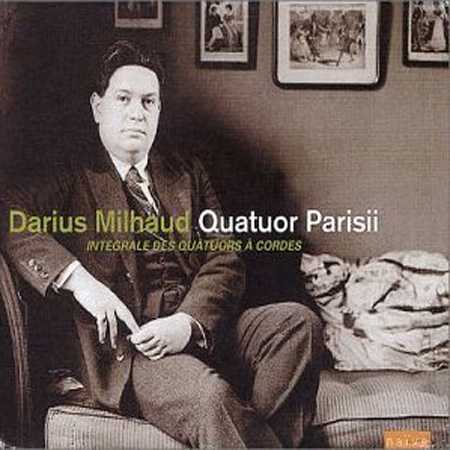
Composer: Darius Milhaud
Audio CD
SPARS Code: DDD
Number of Discs: 5 CD box set
Format: FLAC (tracks+cue)
Label: Naive
Size: 2.14 GB
Recovery: +3%
Scan: yes
String Quartet No. 12, Op. 252
String Quartet No. 4, Op. 46
String Quartet No. 9, Op. 140
String Quartet No. 3 with solo voice, Op. 32
String Quartet No. 16, Op. 303
String Quartet No. 2, Op. 16
String Quartet No. 7, Op. 87
String Quartet No. 13, Op. 268
String Quartet No. 5, Op. 64
String Quartet No. 6, Op. 77
String Quartet No. 17, Op. 307
String Quartet No. 18, Op. 308
String Quartet No. 1, Op. 5
String Quartet No. 8, Op. 121
String Quartet No. 10 (“Birthday Quartet”), Op. 218
String Quartet No. 11, Op. 232
Octet (String Quartets Nos. 14 & 15), for double string quartet, Op. 291
String Quartet No. 14, Op. 291/1
String Quartet No. 15, Op. 291/2
Études sur des thèmes liturgiques du comtat Venaissin (3), for string quartet, Op. 442
Hommage à Igor Strawinsky, for string quartet, Op. 435
darius_milhaud_complete_string_quartets02.rar – 422.5 MB
darius_milhaud_complete_string_quartets03.rar – 492.6 MB
darius_milhaud_complete_string_quartets04.rar – 433.8 MB
darius_milhaud_complete_string_quartets05.rar – 477.3 MB
Not only Bartok and Shostakovitch
I thought the two main monuments of string quartets opuses in the XXth century were from these two composers listed above. But in actual fact, Milhaud, mostly known for his ballets Creation du Monde and Le Boeuf sur le Toit, who spent two years in Brazil (where I live) in the 20s, and was part of les Six (with Honnegger, Auric, Tallefeirre, Poulenc and Satie), produced 18 quatuors (one more than Beethoven, a target he set to himself in his youth and managed to achieve brilliantly). What a surprise to me was hearing to this consistent chamber music output, which if not up to the innovative qualities of Bartok, ranks at least in a par with Shostakovitch, varying from his early style, still influenced by Debussy and Stravinsky, through his most creative phase, of development of politonality and rhytmic variety (partly influence by his séjour in Rio de Janeiro, with the consul Paul Claudel, by the suggestion of Blaise Cendrars) through his more mature period in the US, where he brought to certain limits his previous experiences (as in the case of the Octet, where politonality is stretched to a zenith). Like our main composer in Brazil, Villalobos, Milhaud has a very extensive output, with 420 titles, including 10 symphonies, not always of the same stature, but clearly showing an exuberant imagination and rigour. I think it’s more than time to hear more extensively this composer. At least I am doing so. Enjoy




thanks whatever for sharing this wondeful music ..